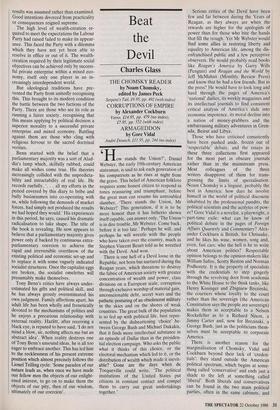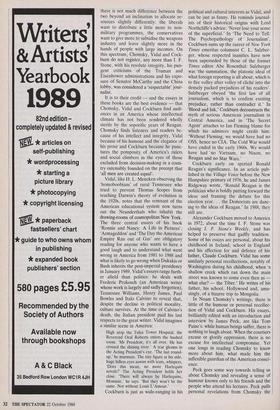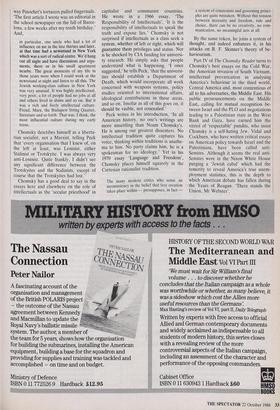Beat the Devil
Charles Glass
THE CHOMSKY READER by Noam Chomsky, edited by James Peck
Serpent's Tail, f9.95, pp. 492 (with index)
CORRUPTIONS OF EMPIRE by Alexander Cockburn
Verso, £14.95, pp. 479 (no index), £7.95, pp. 552 (with index)
ARMAGEDDON by Gore Vidal
Andre Deutsch, f11.95, pp. 244 (no index)
How stands the Union?', Daniel Webster, the early 19th-century American statesman, is said to ask each generation of his compatriots as he rises at night from the grave. This belief of American folklore requires some honest citizen to respond in tones reassuring and triumphant, before the great man can resume his untroubled slumber, 'There stands the Union, Mr Webster!' This generation, if it is to be more honest than it has hitherto shown itself capable, can answer only, 'The Union-- is in dire trouble, Mr Webster. Come back, before it is too late.' Perhaps he will, and perhaps he will wrestle with the people who have taken over the country, much as Stephen Vincent Benet told us he wrestled with the Devil. And won.
There is one hell of a Devil loose in the Republic, not born but nurtured during the Reagan years, which threatens to destroy the fabric of American society with greater concentration of wealth and power, class divisions on a European scale, corruption through exclusive worship of material gain, unconscionable debt, secret wars and the pathetic posturing of an obsolescent military in the skies and on the shores of weak countries. The great bulk of the population is so fed up with political life, best repre- sented by the disheartening 'choice' be- tween George Bush and Michael Dukakis, that it finds more intellectual substance in an episode of Dallas than in the presiden- tial election campaign. Who asks the public what it thinks of this choice, or the electoral mechanism which led to it, or the distribution of wealth which made it inevit- able? Gone are the days when de Tocqueville could write, 'The political institutions of the United States put citizens in constant contact and compel them to carry out great undertakings together.' Serious critics of the Devil have been few and far between during the Years of Reagan, as they always are when the rewards are higher for the apologists of power than for those who bite the hands that fill the trough. Yet Mr Webster would find some allies in restoring liberty and equality to American life, among the dis- enfranchised public and a few perceptive observers. He would probably read books like Reagan's America by Garry Wills (Penguin) and Reagan and the World by Jeff McMahan (Monthly Review Press) and know that he had a few friends. But in the press? He would have to look long and hard through the pages of America's 'national' dailies, its weekly magazines and its intellectual journals to find consistent critical analysis of America's slide into economic impotence, its moral decline into a nation of money-grubbers and the embarrassing military adventures in Gren- ada, Beirut and Libya.
Those who have criticised consistently have been pushed aside, frozen out of 'respectable' debate, and the essays in these three collections first appeared for the most part in obscure journals rather than in the mainstream press. Most colleagues of the three writers disapprove of them for trans- gressing the limits of specialisation. 'Noam Chomsky is a linguist, probably the best in America: how dare he involve himself in the world of political discourse inhabited by the professional pundits, the political scientists and the acolytes of pow- er? Gore Vidal is a novelist, a playwright, a part-time exile: what can he know of political debate in the pages of Foreign Affairs Quarterly and Commentary? Alex- ander Cockburn is British, for Chrissake, and he likes his wine, women, song and, even, fast cars: who the hell is he to write about American politics? Respectable opinion belongs to the opinion-makers like William Safire, Scotty Reston and Norman Podhoretz. It is the property of specialists with the credentials to step gingerly through the revolving door from academia to the White House to the think tanks, like Henry Kissinger and Zbigniew Brezinski, the courtiers whose loyalty to the court rather than the sovereign (the American Constitution says the people are sovereign) makes them as acceptable to a Nelson Rockefeller as to a Richard Nixon, a Jimmy Carter and, now for Brezinski, a George Bush, just as the politicians them- selves must be acceptable to corporate America.
There is another reason for the marginalisation of Chomsky, Vidal and Cockburn beyond their lack of 'creden- tials': they stand outside the American political spectrum, which begins at some- thing called 'conservative' and ends just a shade to the left at something called 'liberal'. Both liberals and conservatives can be found in the two main political parties, often in the same cabinets, and there is not much difference between the two beyond an inclination to allocate re- sources slightly differently: the liberals want to distribute a little more to non- military programmes, the conservatives want to give more to subsidise the weapons industry and leave slightly more in the hands of people with large incomes. On this spectrum, Chomsky, Vidal and Cock- burn do not register, any more than I. F. Stone, with his resolute integrity, his pun- gent criticisms of the Truman and Eisenhower administrations and his expo- sure of Senator McCarthy and the China lobby, was considered a 'respectable' jour- nalist.
It is to their credit — and the essays in these books are the best evidence — that Chomsky, Vidal and Cockburn find audi- ences in an America whose intellectual climate has not been rendered wholly sterile by the soporific years of Reagan. Chomsky finds listeners and readers be- cause of his intellect and integrity, Vidal because of his humour and the elegance of his prose and Cockburn because he punc- tures the pomposity of America's rulers and social climbers in the eyes of those excluded from decision-making in a coun- try ostensibly founded on the precept that `all men are created equal'.
Vidal, like H. L. Mencken observing the `homoboobians' of rural Tennessee who tried to prevent Thomas Scopes from teaching Darwin's theory of evolution in the 1920s, notes that the remnant of the American educational system now turns out the Neanderthals who inhabit the drawing-rooms of cosmopolitan New York. The three central essays of his book `Ronnie and Nancy: A Life in Pictures', `Armageddon' and 'The Day the American Empire Ran out of Gas' are obligatory reading for anyone who wants to have a good laugh and to understand what went wrong in America from 1981 to 1988 and what is likely to go wrong when Dukakis or Bush inherits the post-imperial presidency in January 1989. Vidal's essays range furth- er afield than politics: he deals with Frederic Prokosch (an American writer whose work is largely and sadly forgotten), Tennessee Williams, Henry James, Paul Bowles and Italo Calvino to reveal that, despite the decline in political morality, culture survives. At the time of Calvino's death, the Italian president paid his last respects to the great writer. Vidal imagines a similar scene in America:
High atop the Tulsa Tower Hospital, the Reverend Oral Roberts enters the hushed room. `Mr President, it's all over. He has crossed the shining river.' A tear gleams in the Acting President's eye. 'The last round- up,' he murmurs. The tiny figure at his side, huge lidless eyes aswim with tears, whispers, `Does this mean, no more Harlequin novels?' The Acting President holds her close. 'There will always be Harlequins, Mommie,' he says. 'But they won't be the same. Not without Louis L'Amour.'
Cockburn is just as wide-ranging in his political and cultural interests as Vidal, and can be just as funny. He reminds journal- ists of their historical origins with Lord Northcliffe's advice: 'Never lose your sense of the superficial.' In 'The Need to Tell: The Psychopathology of Journalism', Cockburn sums up the career of New York Times emeritus columnist C. L. Sulzber- ger, whose respected inanities have now been superseded by those of the former Times editor Abe Rosenthal: Sulzberger was 'the summation, the platonic ideal of what foreign reporting is all about, which is to fire volley after volley of cliché into the densely packed prejudices of his readers'. Sulzberger obeyed 'the first law of all journalism, which is to confirm existing prejudice, rather than contradict it.' In `Blood and Ink,' Cockburn deconstructs the myth of serious American journalism in Central America, and in 'The Secret Agent' attaches to Ian Fleming blame for which his admirers might credit him: `Without Fleming, we would have had no OSS, hence no CIA. The Cold War would have ended in the early 1960s. We would have had ' no Vietnam, no Nixon, no Reagan and no Star Wars.'
Cockburn early on spotted Ronald Reagan's significance. In an article pub- lished in the Village Voice before the New Hampshire primary of 1976, he and James Ridgeway wrote, 'Ronald Reagan is the politician who is boldly putting forward the ideas and framing the debate for this election year. . . the Democrats are danc- ing to the ideas of Reagan.' In 1988, they still are.
Alexander Cockburn moved to America in 1972, about the time I. F. Stone was closing I. F. Stone's Weekly, and has helped to preserve that gadfly tradition. Some of his essays are personal, about his childhood in Ireland, school in England and his affection for and defence of his father, Claude Cockburn. Vidal has some similarly personal recollections, notably of Washington during his childhood, when 'a shallow creek which ran down the main street was known to some even then as what else? — the Tiber.' He writes of his father, his school, Hollywood and, amu- singly, of a bizarre trip to Mongolia.
In Noam Chomsky's writings, there is little of the humour or personal recollec- tion of Vidal and Cockburn. His essays, brilliantly edited with an introduction and interview by James Peck, are like Tom Paine's: while human beings suffer, there is nothing to laugh about. When the courtiers excuse or glorify oppression, there is no excuse for intellectual compromise. Yet one longs in reading Chomsky to know more about him, what made him the inflexible guardian of the American consci- ence.
Peck goes some way towards telling us about Chomsky and revealing a sense of humour known only to his friends and the people who attend his lectures. Peck pulls personal revelations from Chomsky the way Pinochet's torturers pulled fingernails. 'The first article I wrote was an editorial in the school newspaper on the fall of Barce- lona, a few weeks after my tenth birthday.' And,
in particular, one uncle who had a lot of influence on me in the late thirties and later, at that time had a newsstand in New York which was a sort of radical centre. We'd hang out all night and have discussions and argu- ments, there or in his small apartment nearby. The great moments of my life in those years were when I could work at the newsstand at night and listen to all this. The Jewish working-class culture in New York was very unusual. It was highly intellectual, very poor, a lot of people had no jobs at all and others lived in slums and so on. But it was a rich and lively intellectual culture. Freud, Marx, the Budapest String Quartet, literature and so forth. That was, I think, the most influential culture during my early teens.
Chomsky describes himself as a liberta- rian socialist, not a Marxist, telling Peck that 'every organisation that I knew of, on the left at least, was Leninist, either Stalinist or Trotskyite. 1 was always very anti-Leninist. Quite frankly, I didn't see any significant difference between the Trotskyites and the Stalinists, except of course that the Trotskyites had lost.'
Chomsky has a good deal to say in the essays here and elsewhere on the role of intellectuals as the 'secular priesthood' in capitalist and communist countries. He wrote in a 1966 essay, 'The Responsibility of Intellectuals', 'It is the responsibility of intellectuals to speak the truth and expose lies.' Chomsky is not surprised if intellectuals as a class seek a system, whether of left or right, which will guarantee them privileges and status- Nor is he shocked by CIA funding for universi- ty research. He simply asks that people understand what is happening. 'I once suggested,' he tells Peck, 'that the universi- ties should establish a Department of Death, which would incorporate all work concerned with weapons systems, policy studies oriented to international affairs, ideological contributions in these areas, and so on. Insofar as all of this goes on, it should be visible, not concealed.'
Peck writes in his introduction, 'In all American history, no one's writings are more unsettling than Noam Chomsky's. He is among our greatest dissenters. No intellectual tradition quite captures his voice, thinking within traditions is anathe- ma to him. No party claims him, he is a spokesman for no ideology.' Yet in his 1970 essay 'Language and Freedom', Chomsky places himself squarely in the Cartesian rationalist tradition.
The many modern critics who sense an inconsistency in the belief that free creation takes place within — presupposes, in fact — a system of constraints and governing princi- ples are quite mistaken. Without this tension between necessity and freedom, rule and choice, there can be no creativity, no com- munication, no meaningful acts at all.
By the same token, he joins a system of thought, and indeed enhances it, in his attacks on B. F. Skinner's theory of be- haviourism.
Part IV of The Chomsky Reader turns to Chomsky's best essays on the Cold War, the American invasion of South Vietnam, intellectual prevarication in analysing America's behaviour in the third world, Central America and, most contentious of all to his adversaries, the Middle East. His public pronouncements on the Middle East, calling for mutual recognition be- tween Israel and the PLO and negotiations leading to a Palestinian state in the West Bank and Gaza, have earned him the vitriol of 'respectable' pundits, who insist Chomsky is a self-hating Jew. Vidal and Cockburn, who have written critical essays on American policy towards Israel and the Palestinians, have been called anti- Semites. Although it seems the real anti- Semites were in the Nixon White House purging a 'Jewish cabal' which had the temerity to reveal America's true unem- ployment statistics, this is the depth to which American debate has fallen during the Years of Reagan. 'There stands the Union, Mr Webster'.




































































 Previous page
Previous page